MANAGEMENT ACCOUNTING FOR NON-ACCOUNTANTS
VerifiedAdded on 2024/04/11
|6
|1056
|278
AI Summary
Contribute Materials
Your contribution can guide someone’s learning journey. Share your
documents today.
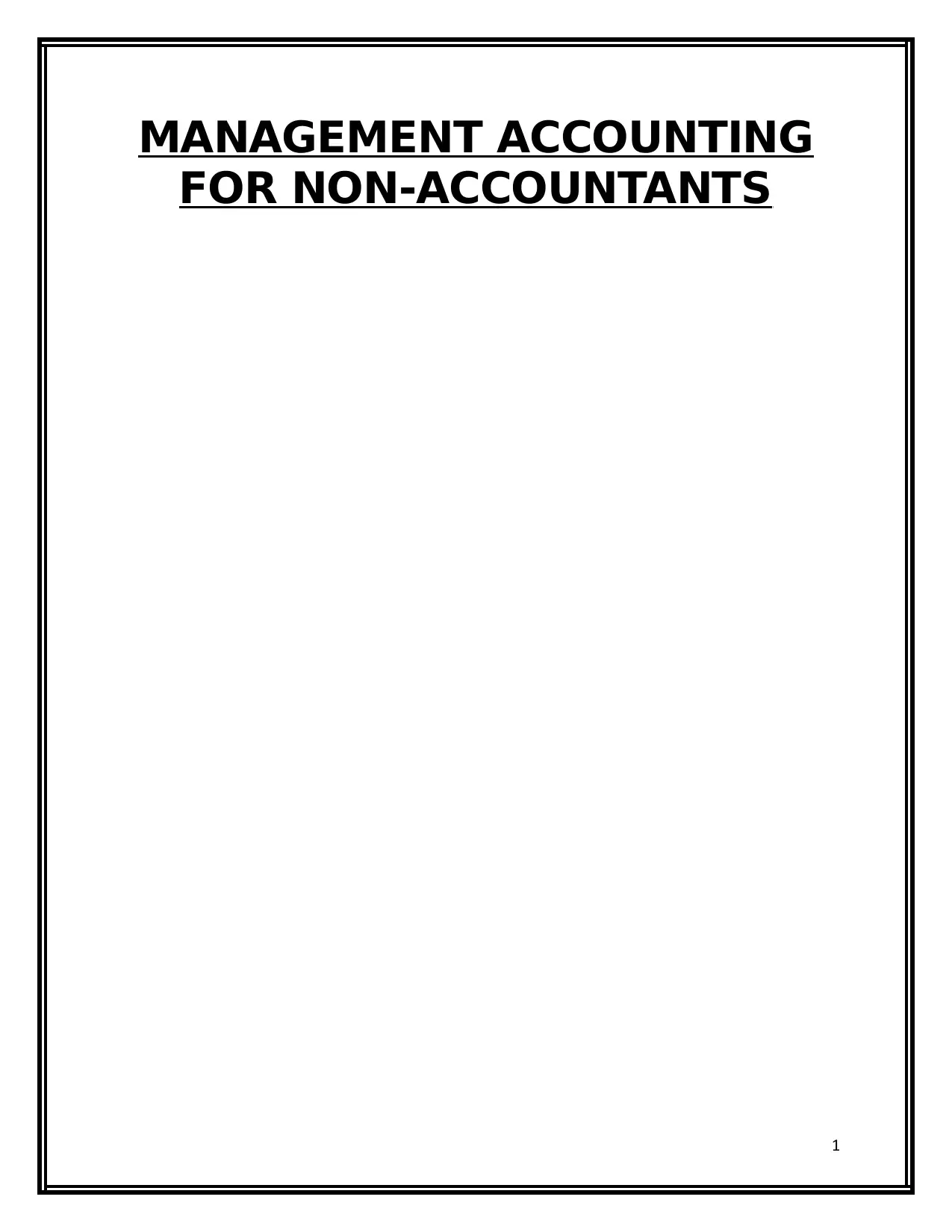
MANAGEMENT ACCOUNTING
FOR NON-ACCOUNTANTS
1
FOR NON-ACCOUNTANTS
1
Secure Best Marks with AI Grader
Need help grading? Try our AI Grader for instant feedback on your assignments.
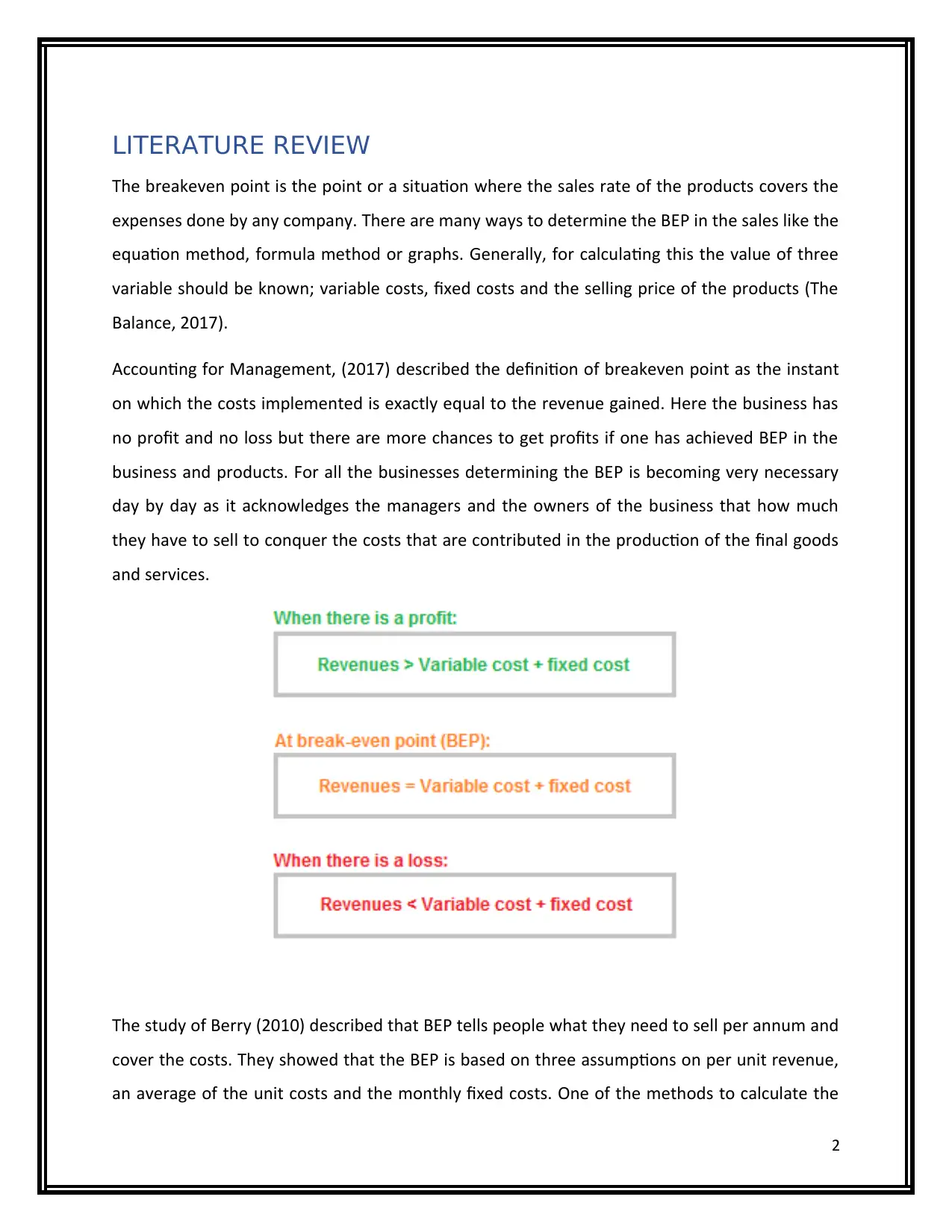
LITERATURE REVIEW
The breakeven point is the point or a situation where the sales rate of the products covers the
expenses done by any company. There are many ways to determine the BEP in the sales like the
equation method, formula method or graphs. Generally, for calculating this the value of three
variable should be known; variable costs, fixed costs and the selling price of the products (The
Balance, 2017).
Accounting for Management, (2017) described the definition of breakeven point as the instant
on which the costs implemented is exactly equal to the revenue gained. Here the business has
no profit and no loss but there are more chances to get profits if one has achieved BEP in the
business and products. For all the businesses determining the BEP is becoming very necessary
day by day as it acknowledges the managers and the owners of the business that how much
they have to sell to conquer the costs that are contributed in the production of the final goods
and services.
The study of Berry (2010) described that BEP tells people what they need to sell per annum and
cover the costs. They showed that the BEP is based on three assumptions on per unit revenue,
an average of the unit costs and the monthly fixed costs. One of the methods to calculate the
2
The breakeven point is the point or a situation where the sales rate of the products covers the
expenses done by any company. There are many ways to determine the BEP in the sales like the
equation method, formula method or graphs. Generally, for calculating this the value of three
variable should be known; variable costs, fixed costs and the selling price of the products (The
Balance, 2017).
Accounting for Management, (2017) described the definition of breakeven point as the instant
on which the costs implemented is exactly equal to the revenue gained. Here the business has
no profit and no loss but there are more chances to get profits if one has achieved BEP in the
business and products. For all the businesses determining the BEP is becoming very necessary
day by day as it acknowledges the managers and the owners of the business that how much
they have to sell to conquer the costs that are contributed in the production of the final goods
and services.
The study of Berry (2010) described that BEP tells people what they need to sell per annum and
cover the costs. They showed that the BEP is based on three assumptions on per unit revenue,
an average of the unit costs and the monthly fixed costs. One of the methods to calculate the
2
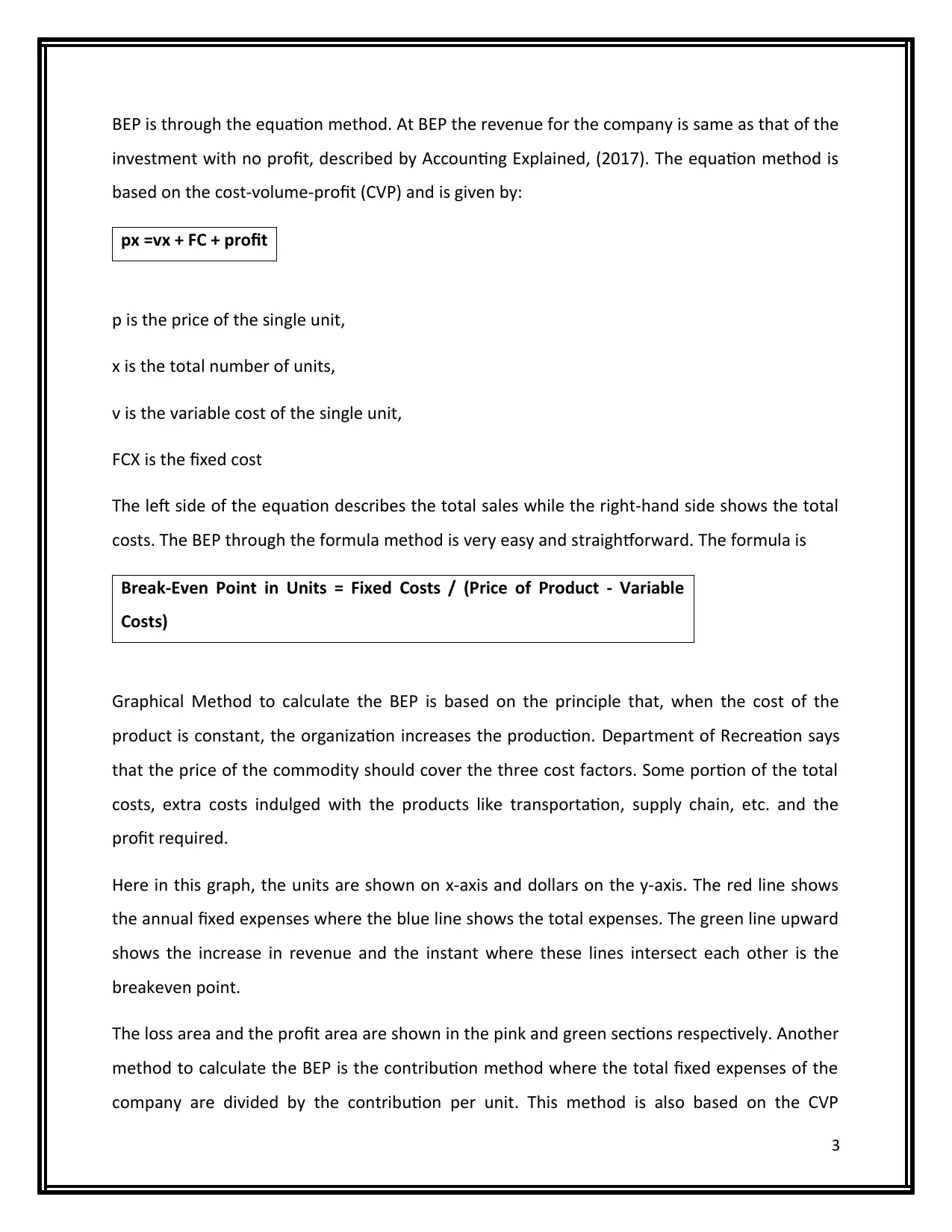
BEP is through the equation method. At BEP the revenue for the company is same as that of the
investment with no profit, described by Accounting Explained, (2017). The equation method is
based on the cost-volume-profit (CVP) and is given by:
px =vx + FC + profit
p is the price of the single unit,
x is the total number of units,
v is the variable cost of the single unit,
FCX is the fixed cost
The left side of the equation describes the total sales while the right-hand side shows the total
costs. The BEP through the formula method is very easy and straightforward. The formula is
Break-Even Point in Units = Fixed Costs / (Price of Product - Variable
Costs)
Graphical Method to calculate the BEP is based on the principle that, when the cost of the
product is constant, the organization increases the production. Department of Recreation says
that the price of the commodity should cover the three cost factors. Some portion of the total
costs, extra costs indulged with the products like transportation, supply chain, etc. and the
profit required.
Here in this graph, the units are shown on x-axis and dollars on the y-axis. The red line shows
the annual fixed expenses where the blue line shows the total expenses. The green line upward
shows the increase in revenue and the instant where these lines intersect each other is the
breakeven point.
The loss area and the profit area are shown in the pink and green sections respectively. Another
method to calculate the BEP is the contribution method where the total fixed expenses of the
company are divided by the contribution per unit. This method is also based on the CVP
3
investment with no profit, described by Accounting Explained, (2017). The equation method is
based on the cost-volume-profit (CVP) and is given by:
px =vx + FC + profit
p is the price of the single unit,
x is the total number of units,
v is the variable cost of the single unit,
FCX is the fixed cost
The left side of the equation describes the total sales while the right-hand side shows the total
costs. The BEP through the formula method is very easy and straightforward. The formula is
Break-Even Point in Units = Fixed Costs / (Price of Product - Variable
Costs)
Graphical Method to calculate the BEP is based on the principle that, when the cost of the
product is constant, the organization increases the production. Department of Recreation says
that the price of the commodity should cover the three cost factors. Some portion of the total
costs, extra costs indulged with the products like transportation, supply chain, etc. and the
profit required.
Here in this graph, the units are shown on x-axis and dollars on the y-axis. The red line shows
the annual fixed expenses where the blue line shows the total expenses. The green line upward
shows the increase in revenue and the instant where these lines intersect each other is the
breakeven point.
The loss area and the profit area are shown in the pink and green sections respectively. Another
method to calculate the BEP is the contribution method where the total fixed expenses of the
company are divided by the contribution per unit. This method is also based on the CVP
3
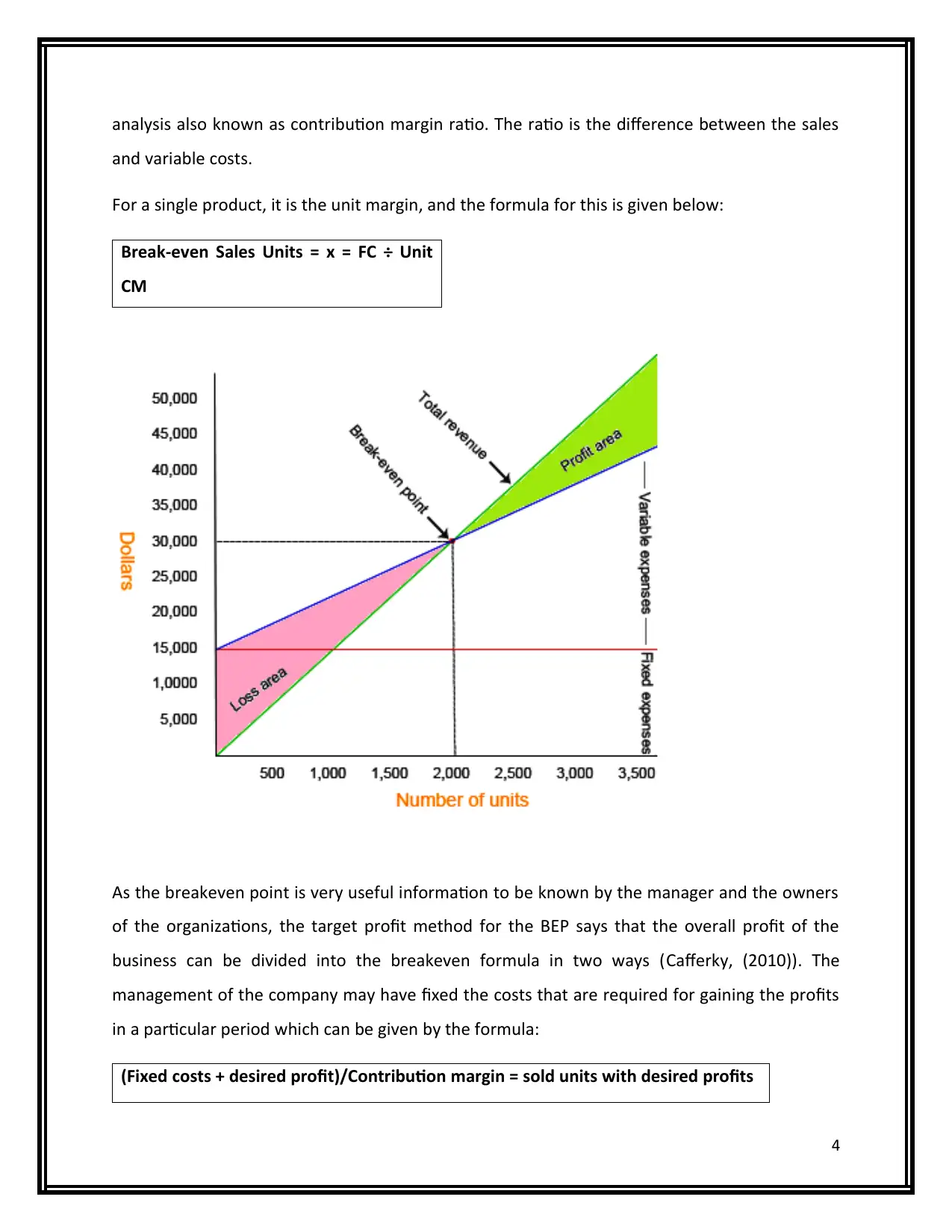
analysis also known as contribution margin ratio. The ratio is the difference between the sales
and variable costs.
For a single product, it is the unit margin, and the formula for this is given below:
Break-even Sales Units = x = FC ÷ Unit
CM
As the breakeven point is very useful information to be known by the manager and the owners
of the organizations, the target profit method for the BEP says that the overall profit of the
business can be divided into the breakeven formula in two ways (Cafferky, (2010)). The
management of the company may have fixed the costs that are required for gaining the profits
in a particular period which can be given by the formula:
(Fixed costs + desired profit)/Contribution margin = sold units with desired profits
4
and variable costs.
For a single product, it is the unit margin, and the formula for this is given below:
Break-even Sales Units = x = FC ÷ Unit
CM
As the breakeven point is very useful information to be known by the manager and the owners
of the organizations, the target profit method for the BEP says that the overall profit of the
business can be divided into the breakeven formula in two ways (Cafferky, (2010)). The
management of the company may have fixed the costs that are required for gaining the profits
in a particular period which can be given by the formula:
(Fixed costs + desired profit)/Contribution margin = sold units with desired profits
4
Secure Best Marks with AI Grader
Need help grading? Try our AI Grader for instant feedback on your assignments.
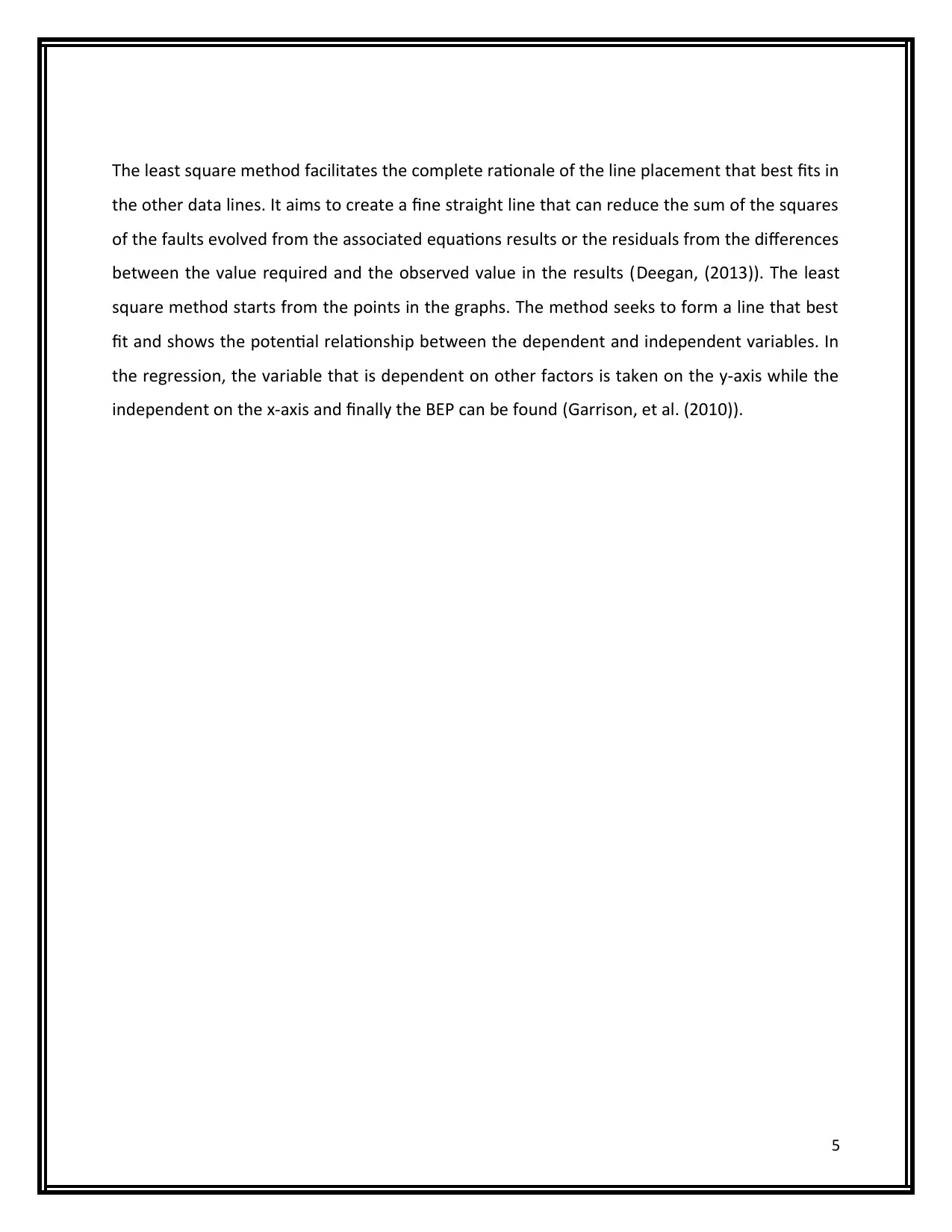
The least square method facilitates the complete rationale of the line placement that best fits in
the other data lines. It aims to create a fine straight line that can reduce the sum of the squares
of the faults evolved from the associated equations results or the residuals from the differences
between the value required and the observed value in the results (Deegan, (2013)). The least
square method starts from the points in the graphs. The method seeks to form a line that best
fit and shows the potential relationship between the dependent and independent variables. In
the regression, the variable that is dependent on other factors is taken on the y-axis while the
independent on the x-axis and finally the BEP can be found (Garrison, et al. (2010)).
5
the other data lines. It aims to create a fine straight line that can reduce the sum of the squares
of the faults evolved from the associated equations results or the residuals from the differences
between the value required and the observed value in the results (Deegan, (2013)). The least
square method starts from the points in the graphs. The method seeks to form a line that best
fit and shows the potential relationship between the dependent and independent variables. In
the regression, the variable that is dependent on other factors is taken on the y-axis while the
independent on the x-axis and finally the BEP can be found (Garrison, et al. (2010)).
5
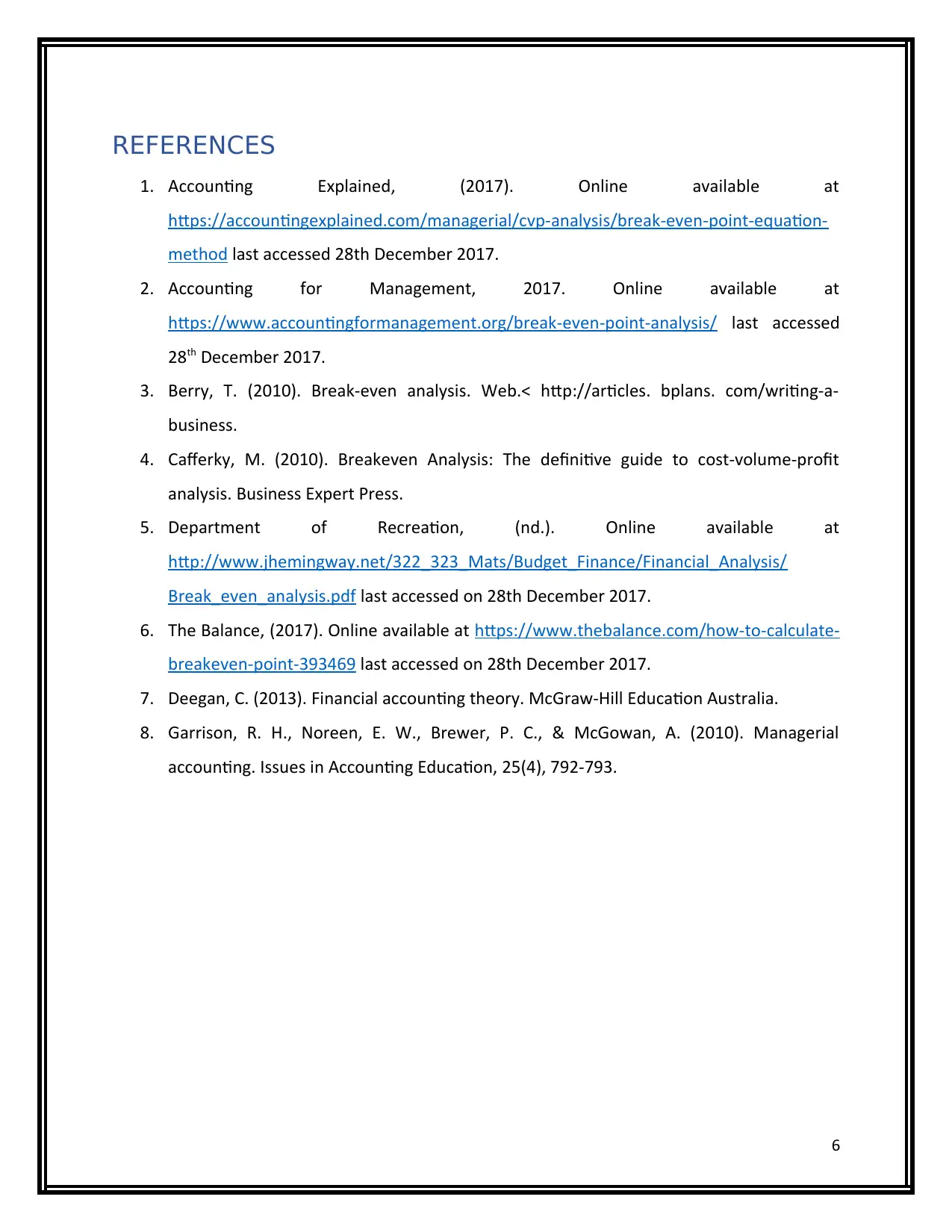
REFERENCES
1. Accounting Explained, (2017). Online available at
https://accountingexplained.com/managerial/cvp-analysis/break-even-point-equation-
method last accessed 28th December 2017.
2. Accounting for Management, 2017. Online available at
https://www.accountingformanagement.org/break-even-point-analysis/ last accessed
28th December 2017.
3. Berry, T. (2010). Break-even analysis. Web.< http://articles. bplans. com/writing-a-
business.
4. Cafferky, M. (2010). Breakeven Analysis: The definitive guide to cost-volume-profit
analysis. Business Expert Press.
5. Department of Recreation, (nd.). Online available at
http://www.jhemingway.net/322_323_Mats/Budget_Finance/Financial_Analysis/
Break_even_analysis.pdf last accessed on 28th December 2017.
6. The Balance, (2017). Online available at https://www.thebalance.com/how-to-calculate-
breakeven-point-393469 last accessed on 28th December 2017.
7. Deegan, C. (2013). Financial accounting theory. McGraw-Hill Education Australia.
8. Garrison, R. H., Noreen, E. W., Brewer, P. C., & McGowan, A. (2010). Managerial
accounting. Issues in Accounting Education, 25(4), 792-793.
6
1. Accounting Explained, (2017). Online available at
https://accountingexplained.com/managerial/cvp-analysis/break-even-point-equation-
method last accessed 28th December 2017.
2. Accounting for Management, 2017. Online available at
https://www.accountingformanagement.org/break-even-point-analysis/ last accessed
28th December 2017.
3. Berry, T. (2010). Break-even analysis. Web.< http://articles. bplans. com/writing-a-
business.
4. Cafferky, M. (2010). Breakeven Analysis: The definitive guide to cost-volume-profit
analysis. Business Expert Press.
5. Department of Recreation, (nd.). Online available at
http://www.jhemingway.net/322_323_Mats/Budget_Finance/Financial_Analysis/
Break_even_analysis.pdf last accessed on 28th December 2017.
6. The Balance, (2017). Online available at https://www.thebalance.com/how-to-calculate-
breakeven-point-393469 last accessed on 28th December 2017.
7. Deegan, C. (2013). Financial accounting theory. McGraw-Hill Education Australia.
8. Garrison, R. H., Noreen, E. W., Brewer, P. C., & McGowan, A. (2010). Managerial
accounting. Issues in Accounting Education, 25(4), 792-793.
6
1 out of 6
Related Documents
Your All-in-One AI-Powered Toolkit for Academic Success.
+13062052269
info@desklib.com
Available 24*7 on WhatsApp / Email
![[object Object]](/_next/static/media/star-bottom.7253800d.svg)
Unlock your academic potential
© 2024 | Zucol Services PVT LTD | All rights reserved.





